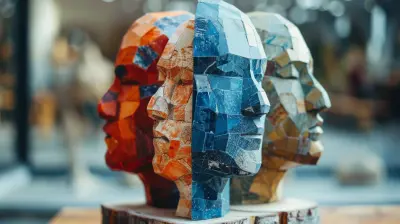How Family Therapy Can Help Heal Generational Trauma
4 February 2025
Have you ever felt like you’re carrying the weight of your ancestors' struggles on your shoulders? Maybe you sometimes notice patterns in your family that seem to repeat themselves over and over, no matter how hard people try to break free from them. It’s almost as if the past has a grip on the present. This, my friend, is what we call generational trauma, and it can have a lasting impact on families. But here's the good news: family therapy can be a powerful tool to help heal these deep-rooted wounds.
In this article, we'll dive into how family therapy can be used to heal generational trauma, why it's so effective, and what you can expect from this therapeutic process. So, grab a cup of coffee, get comfortable, and let’s explore the healing potential of family therapy together.

What is Generational Trauma?
Before we jump into how family therapy can help, let’s first break down what we mean by generational trauma. Also known as intergenerational or transgenerational trauma, this refers to trauma that is passed down from one generation to the next. It’s the emotional, psychological, or even physical scars that are carried from parents to children, and sometimes, to grandchildren.Generational trauma can stem from a variety of sources, such as:
- War or genocide: Families who have experienced traumatic events like war, ethnic cleansing, or genocide can carry the emotional residue of those experiences long after the events have passed.
- Oppression and discrimination: Systemic racism, colonialism, and other forms of discrimination can leave lasting scars on families and communities.
- Abuse and neglect: Unaddressed abuse or neglect in one generation can lead to patterns of dysfunctional behavior in subsequent generations.
- Addiction: Substance abuse issues can also be passed down, as children may normalize or replicate the behaviors they observed growing up.
Trauma, when left unaddressed, doesn’t just disappear. It lingers and manifests in subtle (or not-so-subtle) ways—whether that’s through anxiety, depression, dysfunctional relationships, or even physical health problems. The tricky part? Many people may not even realize they’re dealing with generational trauma because it feels so ingrained in the family dynamic.

How Does Generational Trauma Show Up?
Generational trauma doesn’t always announce itself loudly. It’s more like a shadow that quietly follows families. You might notice it through behaviors, attitudes, or emotional responses that seem "normal" within the family but unhealthy from an outside perspective. Here are a few ways it can manifest:- Repeated family patterns: Does your family seem to have a "curse," where the same issues—like addiction, financial hardship, or broken relationships—keep cropping up, no matter how hard people try to change?
- Emotional numbness or overreactivity: Some family members may act completely detached and unemotional, while others might seem overly sensitive or reactive to minor issues.
- Fear of intimacy or vulnerability: Generational trauma can create walls between family members, making it difficult to foster close, trusting relationships.
- Anxiety and hypervigilance: Families may feel like they’re always waiting for the next disaster to strike, even if there’s no immediate threat.
- Guilt and shame: Many people who experience generational trauma carry a deep sense of guilt or shame, even if they haven’t done anything wrong. This can lead to self-sabotage and self-destructive behavior.
These patterns can make life feel heavy and overwhelming, but they don’t have to be permanent. This is where family therapy enters the picture.

What is Family Therapy?
Family therapy, also known as family counseling, is a type of psychological treatment designed to help families communicate better, resolve conflicts, and create healthier relationships. Unlike individual therapy, which focuses solely on one person’s thoughts and behaviors, family therapy looks at the family as a whole system. This means that the therapist doesn’t just focus on one "problem person" but instead looks at how everyone in the family interacts and contributes to the dynamics.Family therapy can be particularly effective when dealing with generational trauma because it addresses the root cause of the trauma within the context of the family unit. Instead of trying to "fix" one person, the goal is to heal the family as a whole.
Types of Family Therapy Modalities
Different therapists may use different approaches depending on the family’s unique needs, but some popular types of family therapy include:- Structural Family Therapy: Focuses on reorganizing family roles and boundaries to create healthier dynamics.
- Bowenian Family Therapy: Explores the multigenerational transmission of behaviors and emotions, making it ideal for addressing generational trauma.
- Narrative Family Therapy: Helps family members reframe their stories in a way that promotes healing and personal growth.
- Solution-Focused Brief Family Therapy: Concentrates on finding practical solutions to problems rather than dwelling on the past.

How Family Therapy Can Help Heal Generational Trauma
Now that we’ve covered the basics, let’s dive into how family therapy can actually help heal generational trauma.1. Creating Awareness
The first step toward healing generational trauma is becoming aware of it. Many families operate on autopilot, repeating patterns without realizing why they’re doing so. In family therapy, a trained therapist can help identify and map out these recurring patterns.Think of it like a family tree but for emotional and behavioral patterns. Once you can see the patterns, you can start to understand where they came from and why they continue to exist. Knowledge is power, and simply becoming aware of the trauma can be incredibly freeing for many families.
2. Improving Communication
At the heart of many family issues is poor communication. Family members may not know how to express their emotions, or they may avoid difficult topics because they’re afraid of conflict. Generational trauma can make this even worse, as families may have learned to "keep quiet" about certain things due to past experiences.Family therapy creates a safe space for open and honest conversation. A therapist can teach family members how to communicate in a way that is respectful, clear, and compassionate. This can be a game-changer for families who have been walking on eggshells for years.
3. Breaking the Cycle of Dysfunction
Generational trauma often leads to dysfunctional family patterns, such as codependency, enabling, or emotional manipulation. Family therapy can help break these unhealthy cycles by addressing the underlying issues that keep them going.For example, if a family has a history of substance abuse, the therapist might work with them to examine how enabling behaviors have contributed to the problem. Once the family understands how these patterns are perpetuating the trauma, they can start to make more conscious choices to break the cycle.
4. Processing Unresolved Emotions
One of the most powerful aspects of family therapy is that it provides a space for family members to process unresolved emotions. Generational trauma often involves a lot of buried feelings—such as anger, grief, or fear—that haven’t been properly addressed.In therapy, family members can safely express these emotions, often for the first time. This emotional release can be incredibly cathartic and can help to dissolve some of the tension that has been festering within the family for years or even decades.
5. Rebuilding Trust and Connection
Trauma can create distance between family members, making it difficult for them to trust one another or feel close. Family therapy helps rebuild these fractured relationships by fostering understanding and empathy. Through guided conversations and activities, family members can begin to see each other in a new light.This process of rebuilding trust and connection is essential for healing generational trauma. When families can come together and support one another, they create a foundation of love and security that can help prevent trauma from being passed down to future generations.
6. Empowering Families to Move Forward
Finally, family therapy empowers families to move forward in a healthier, more positive direction. It’s not just about looking at the past; it’s also about creating a new future. A therapist can work with the family to set goals, develop coping strategies, and establish new patterns of behavior that promote healing and growth.By the end of the therapy process, families often feel more connected, more resilient, and more capable of handling the challenges that life throws their way.
What to Expect from Family Therapy for Generational Trauma
If you’re considering family therapy to address generational trauma, you might be wondering what the process looks like. While every family is different, here’s a general idea of what you can expect:- Initial assessment: The therapist will spend some time getting to know your family, identifying the main issues, and discussing the goals for therapy.
- Regular sessions: Most families will attend therapy once a week, although this can vary depending on the family’s needs.
- Homework: Some therapists may assign "homework" between sessions, such as practicing new communication techniques or journaling about certain topics.
- Progress tracking: Throughout the process, the therapist will help the family track their progress and adjust goals as needed.
Family therapy is a journey, and healing generational trauma takes time. But with commitment and the right guidance, it’s absolutely possible.
Final Thoughts
Generational trauma may feel like an invisible weight, but it doesn’t have to be a life sentence. Family therapy offers a path toward healing, helping families break free from the chains of the past and build healthier, more nurturing relationships in the present.By creating awareness, improving communication, processing emotions, and rebuilding trust, family therapy helps families heal from the inside out. The road to recovery may not be easy, but it’s worth it. After all, healing one generation helps the next to thrive.
all images in this post were generated using AI tools
Category:
PsychotherapyAuthor:

Janet Conrad
Discussion
rate this article
9 comments
Tenley Strickland
Great insights on family therapy! Addressing generational trauma can truly foster healing and strengthen family bonds. Thank you!
April 3, 2025 at 4:47 PM

Janet Conrad
Thank you for your kind words! I'm glad you found the insights helpful. Generational trauma is a crucial topic, and therapy can make a significant difference.
Maria Pope
Family therapy offers a powerful path to healing, breaking cycles of trauma and fostering love across generations.
March 18, 2025 at 4:54 PM

Janet Conrad
Thank you! Family therapy indeed plays a crucial role in healing and transforming family dynamics for future generations.
Theo Clayton
This article highlights such an important topic! It’s fascinating to think about how family therapy can bridge the gap between generations, fostering understanding and healing. I’m eager to learn more about the specific techniques used to address generational trauma.
February 15, 2025 at 5:56 AM

Janet Conrad
Thank you for your comment! I'm glad you enjoyed the article. I will definitely explore specific techniques used in family therapy to address generational trauma in future pieces. Stay tuned!
Vanta Foster
Thank you for this insightful article! It beautifully highlights the importance of family therapy in addressing generational trauma. By fostering open communication and understanding, families can break cycles of pain and create a healthier future. Your emphasis on healing resonates deeply and offers hope for many.
February 14, 2025 at 5:49 PM

Janet Conrad
Thank you for your kind words! I'm glad the article resonated with you and highlighted the vital role of family therapy in healing.
Vaughn Fields
Family therapy serves as a bridge across generations, illuminating the unseen patterns of trauma. By fostering open dialogue, it empowers families to confront and heal inherited wounds, ultimately transforming pain into understanding and resilience for future generations.
February 13, 2025 at 3:22 PM

Janet Conrad
Thank you for your insightful comment! Family therapy truly plays a crucial role in revealing and addressing the patterns of trauma that affect generations, enabling healing and resilience.
Lyla Hubbard
What a fantastic read! Family therapy truly is a powerful tool for healing. It nurtures connection and fosters understanding across generations. 🌟
February 10, 2025 at 4:25 PM

Janet Conrad
Thank you! I'm glad you enjoyed the article and appreciate your insight on the importance of family therapy in healing generational trauma. 🌟
Hesper Adams
Who knew family therapy could be the ultimate time machine? Turn back the clock on generational trauma, and instead of passing down old baggage, let’s gift future generations healthier coping skills—perfect for those awkward family reunions!
February 9, 2025 at 3:39 PM

Janet Conrad
Absolutely! Family therapy truly empowers us to break the cycle of trauma and equip future generations with healthier tools for connection and understanding.
Finn Wagner
Family therapy is a powerful tool for addressing and healing deep-rooted generational trauma.
February 6, 2025 at 5:38 PM

Janet Conrad
Absolutely! Family therapy provides a safe space for open dialogue, helping to break the cycle of trauma and foster understanding across generations.
Lexi McLemore
Generational trauma is like a shadow; it shapes our behaviors without us even realizing it. Family therapy shines a light on these patterns, empowering us to break the cycle and rewrite our narratives. Healing starts with understanding—let's embrace the journey together.
February 5, 2025 at 3:28 PM

Janet Conrad
Thank you for your insightful comment! You beautifully capture the essence of family therapy in addressing generational trauma. Understanding these patterns is indeed the first step towards healing.
MORE POSTS

How PTSD Affects Decision-Making and Problem-Solving

How Your Personality Type Influences Your Stress Response

Working with Parts: An Introduction to Internal Family Systems Therapy

Using Mindfulness to Overcome Fear of Failure

How Psychotherapy Can Help You Break Negative Thought Patterns

How to Choose the Right Therapist for You

The Benefits of Third-Party Mediation in Conflict Resolution